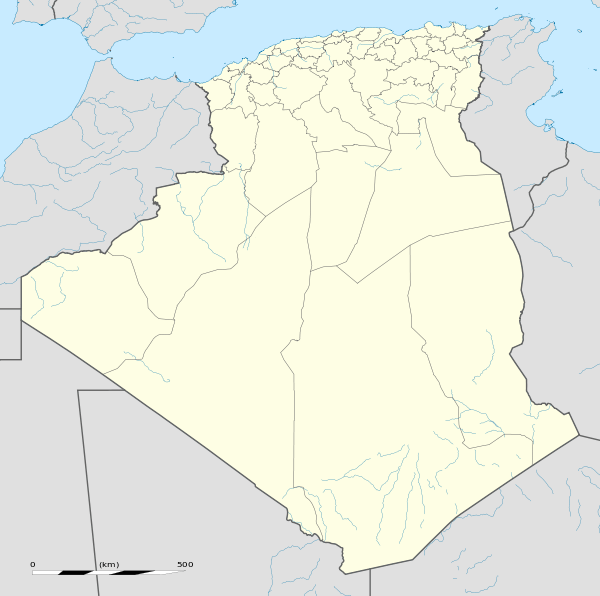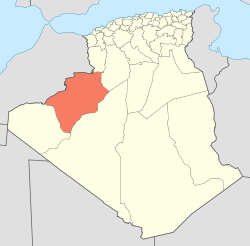Abadla
| Abadla اﻟﻌﺒﺎدﻟﺔ | |
|---|---|
| Commune and town | |
|
Small dam near Abadla | |
 Location of Abadla commune within Béchar Province | |
 Abadla Location of Abadla within Algeria | |
| Coordinates: 31°1′N 2°44′W / 31.017°N 2.733°WCoordinates: 31°1′N 2°44′W / 31.017°N 2.733°W | |
| Country |
|
| Province | Béchar Province |
| District | Abadla District |
| Area[1] | |
| • Total | 2,870 km2 (1,110 sq mi) |
| Elevation | 592 m (1,942 ft) |
| Population (2008)[2] | |
| • Total | 13,636 |
| • Density | 4.8/km2 (12/sq mi) |
| Time zone | CET (UTC+1) |
Abadla (Arabic: ﺑﻨﻰ ﻳﺨﻠﻒ) is a town and commune in western Algeria, and capital of Abadla District, Béchar Province. It is located on the Oued Guir southwest of Béchar. According to the 2008 census its population is 13,636,[2] up from 10,845 in 1998,[3] and an annual growth rate of 2.4%,[2] making it the most populated commune in Béchar Province apart from the capital. The commune covers an area of 2,870 square kilometres (1,110 sq mi).[1]
It is a major centre for the Arab Doui-Menia tribe.
Geography
Abadla's location on the Oued Guir allows the growing of grain, facilitated in recent decades by the Djorf Torba dam located upstream. The area south of the town is mostly a flat plain, but there are several rocky hills found to the north of the town.
Climate
Abadla has a hot desert climate (Köppen climate classification BWh), with extremely hot summers and cool winters, and very little precipitation throughout the year.
| Climate data for Abadla | |||||||||||||
|---|---|---|---|---|---|---|---|---|---|---|---|---|---|
| Month | Jan | Feb | Mar | Apr | May | Jun | Jul | Aug | Sep | Oct | Nov | Dec | Year |
| Average high °C (°F) | 17.4 (63.3) |
20.7 (69.3) |
24.2 (75.6) |
28.8 (83.8) |
33.4 (92.1) |
38.1 (100.6) |
42.5 (108.5) |
41.1 (106) |
35.8 (96.4) |
29.2 (84.6) |
22 (72) |
18.2 (64.8) |
29.28 (84.75) |
| Daily mean °C (°F) | 10.2 (50.4) |
13.2 (55.8) |
16.9 (62.4) |
21.2 (70.2) |
25.7 (78.3) |
30.4 (86.7) |
34.6 (94.3) |
33.5 (92.3) |
28.7 (83.7) |
22.2 (72) |
15.6 (60.1) |
11.1 (52) |
21.94 (71.52) |
| Average low °C (°F) | 3.1 (37.6) |
5.8 (42.4) |
9.6 (49.3) |
13.7 (56.7) |
18 (64) |
22.8 (73) |
26.7 (80.1) |
26 (79) |
21.6 (70.9) |
15.2 (59.4) |
9.2 (48.6) |
4.3 (39.7) |
14.67 (58.39) |
| Average precipitation mm (inches) | 7 (0.28) |
5 (0.2) |
8 (0.31) |
5 (0.2) |
4 (0.16) |
3 (0.12) |
2 (0.08) |
3 (0.12) |
6 (0.24) |
9 (0.35) |
10 (0.39) |
7 (0.28) |
69 (2.73) |
| Source: climate-data.org[4] | |||||||||||||
Economy
Agriculture is the main industry in Abadla. The commune has a total of 350 hectares (860 acres) of arable land, of which 233 hectares (580 acres) is irrigated.[5] There are a total of 23,350 date palms planted in the commune.[6] As of 2009 there were 9,814 sheep, 2,777 goats, 1,939 camels, and 80 cattle. There were also 4000 chickens in 3 buildings.[7]
Infrastructure and housing
100% of Abadla's population is connected to drinking water,[8] 99% is connected to the sewerage system,[9] and 83% (including 2,527 buildings) have access to electricity.[10] There is one fuel service station in the town.[11]
Abadla has a total of 2,594 houses, of which 1,982 are occupied, giving an occupation rate of 6.9 inhabitants per occupied building.[12]
Transportation
Abadla is on the N6 national highway between Béchar to the northeast and Adrar to the southeast. The town of Méchraâ Houari Boumédienne is on the highway just to the south, while further to the south the towns of Igli, Béni Abbès and others can be accessed. The N50 highway leaves the N6 to the west just to the southwest of Abadla; it eventually leads to Tindouf, passing Hammaguir and Tinfouchy on the way.
The two other towns in Abadla District are Méchraâ Houari Boumédienne, which is 20 kilometres (12 mi) from Abadla, and Erg Ferradj, which is 12 kilometres (7.5 mi) from Abadla and is accessible by a local road on the northern side of the N6. Abadla is 91 kilometres (57 mi) from the provincial capital, Béchar.[13]
There is a total length of 52 kilometres (32 mi) of roads in the commune.[14]
Abadla was the terminus station of the Mediterranean-Niger-Railway.
Education
There are 7 elementary schools, with 88 classrooms including 61 in use.[15] There are a total of 3,190 school students.[16]
5.9% of the population has a tertiary education, and another 21.3% has competed secondary education.[17] The overall literacy rate is 83.4%, and is 90.0% among males and 76.5% among females.[18]
Health
Abadla has one polyclinic, 5 room care facilities, a maternity ward, 4 private pharmacies, and a medical operating theatre.[19]
Culture
Abadla has a cinema with 200 seats.[20]
Religion
Abadla has 4 operational mosques, with another 1 under construction.[21]
Localities
The commune is composed of two localities:[22]
- Abadla
- Ksi Ksou
References
- 1 2 "Population, Area and Density per Commune" (in French). Official Website of the Wilaya of Bechar. Retrieved 16 March 2013.
- 1 2 3 "Population: Béchar Wilaya" (PDF) (in French). Office National des Statistiques Algérie. Retrieved 13 February 2013.
- ↑ "Algeria Communes". Statoids. Retrieved 9 March 2013.
- ↑ "Climate data for: Abadla". climate-data.org. Retrieved 9 March 2013.
- ↑ "Distribution of Agricultural Land" (in French). Official Website of the Wilaya of Bechar. Retrieved 9 March 2013.
- ↑ "Plant Productions" (in French). Official Website of the Wilaya of Bechar. Retrieved 9 March 2013.
- ↑ "Animal Production" (in French). Official Website of the Wilaya of Bechar. Retrieved 9 March 2013.
- ↑ "Drinking Water" (in French). Official Website of the Wilaya of Bechar. Retrieved 9 March 2013.
- ↑ "Sewerage Networks" (in French). Official Website of the Wilaya of Bechar. Retrieved 9 March 2013.
- ↑ "Electrification" (in French). Official Website of the Wilaya of Bechar. Retrieved 9 March 2013.
- ↑ "Fuel Distribution" (in French). Official Website of the Wilaya of Bechar. Retrieved 9 March 2013.
- ↑ "Housing" (in French). Official Website of the Wilaya of Bechar. Retrieved 9 March 2013.
- ↑ "Presentation" (in French). Site Officiel de la Wilaya de Béchar. Retrieved 19 February 2013.
- ↑ "Density Kilometres" (in French). Official Website of the Wilaya of Bechar. Retrieved 9 March 2013.
- ↑ "School Infrastructure" (in French). Official Website of the Wilaya of Bechar. Retrieved 9 March 2013.
- ↑ "Number of Pupils" (in French). Official Website of the Wilaya of Bechar. Retrieved 9 March 2013.
- ↑ "Structure relative de la population résidente des ménages ordinaires et collectifs âgée de 6 ans et plus selon le niveau d'instruction et la commune de résidence." (PDF) (in French). Office National des Statistiques Algérie. Retrieved 13 February 2013.
- ↑ "Taux d'analphabétisme et taux d'alphabétisation de la population âgée de 15 ans et plus, selon le sexe et la commune de résidence ." (PDF) (in French). Office National des Statistiques Algérie. Retrieved 13 February 2013.
- ↑ "Health Facilities by Commune" (in French). Official Website of the Wilaya of Bechar. Retrieved 9 March 2013.
- ↑ "Cinemas and Museums" (in French). Official Website of the Wilaya of Bechar. Retrieved 9 March 2013.
- ↑ "Mosques and Koranic Rooms" (in French). Official Website of the Wilaya of Bechar. Retrieved 9 March 2013.
- ↑ "Décret n° 84-365, fixant la composition, la consistance et les limites territoriale des communes. Wilaya d'El Oued" (PDF) (in French). Journal officiel de la République Algérienne,. 19 December 1984. p. 1489. Archived from the original (PDF) on 2 March 2013. Retrieved 2 March 2013.
 |
Méridja | Béchar |  | |
| Erg Ferradj Hammaguir |
|
Taghit | ||
| ||||
| | ||||
| Tindouf | Méchraâ Houari Boumédienne Tabelbala |
Igli Béni Abbès Adrar |

